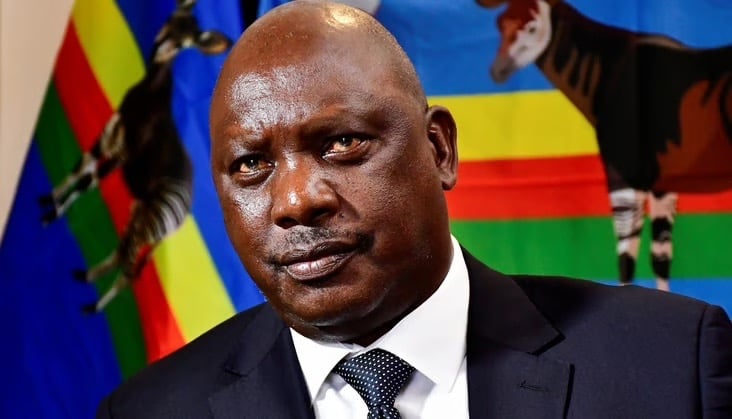The Warlord's Return: Convicted War Criminal Lubanga is Reigniting Conflict in Eastern DRC
Atef Mahmoud Dobal – Political Science Researcher
10/17/20253 min read


In the war-torn Ituri province of the eastern Democratic Republic of the Congo (DRC), a ghost from a bloody past has returned. Thomas Lubanga, the first person ever convicted by the International Criminal Court (ICC) for the war crime of using child soldiers, is back. And he is building a new army.
His re-emergence through a new militia, the Convention for the Revolution of the People (CRP), is not just another chapter in the DRC's long and tragic history of conflict. It is a dangerous escalation that threatens to plunge the region into a new cycle of violence, testing the fragile stability of the Congolese state and the resolve of the international community.
This is a story of a convicted war criminal's audacious bid to reclaim power, a government stretched to its breaking point, and a region once again on the brink of chaos.
Who is Thomas Lubanga?
For those who lived through the brutal ethnic conflicts that tore Ituri apart in the early 2000s, the name Thomas Lubanga is synonymous with terror. As the leader of the Union of Congolese Patriots (UPC) and its military wing, he was a central figure in the violence that pitted the Hema and Lendu communities against each other, a conflict marked by massacres and the widespread recruitment of child soldiers.
His conviction by the ICC in 2012 was a landmark moment for international justice. But after his release from prison in 2020, Lubanga did not fade into obscurity. He returned to his stronghold in Ituri, quietly rebuilding his networks and biding his time. Now, with the launch of the CRP, he has stepped back into the open, determined to force his way back into the center of the DRC's power dynamics.
A New Army, An Old Strategy
The CRP is rapidly expanding its footprint. The militia has seized control of several villages along the strategic Lake Albert, a vital trade corridor connecting the DRC to Uganda. Its fighters are clashing with the Congolese army (FARDC), which is already stretched dangerously thin by the fight against the formidable M23 rebel group in other parts of the east.
Lubanga's strategy is a calculated and cynical one. He is using violence as a political tool, a way to demonstrate his continued relevance and force the government in Kinshasa to give him a seat at the negotiating table. By creating a new security crisis, he aims to transform his image from that of a pariah to a necessary partner in any future peace process.
The implications are terrifying. The renewed fighting has already killed over 200 civilians and displaced an estimated 100,000 people. The militia's presence on the Ugandan border also raises the specter of a wider regional conflict, a nightmare scenario for the fragile Great Lakes region.
A Government in a Bind: Three Paths to an Uncertain Future
The rise of Lubanga's militia has placed the Congolese government in an impossible position. It faces a stark choice between three difficult and dangerous paths.
Scenario 1: The Bloody Stalemate (Most Likely)
The CRP continues its low-intensity insurgency, launching sporadic attacks to maintain pressure without provoking a full-scale war. This would perpetuate the cycle of violence and displacement, further eroding the state's authority and plunging communities deeper into despair. This is the path of a slow-burning crisis with no end in sight.
Scenario 2: The All-Out War
The government, under domestic or international pressure, launches a major military offensive to crush the CRP. While this could deliver a decisive blow, it carries immense risks. A brutal campaign would inevitably lead to massive civilian casualties, create a new humanitarian catastrophe, and could even backfire by strengthening the militia's narrative as a resistance force.
Scenario 3: The Devil's Bargain
Lubanga succeeds in his gambit, and the government, desperate for peace, agrees to negotiate with him. This could reduce the violence in the short term, but it would come at a devastating moral and political cost. Legitimizing a convicted war criminal by bringing him into a peace process would be a slap in the face to his victims, a betrayal of international justice, and a dangerous precedent for other warlords.
Conclusion: A Test of Conscience for the World
The return of Thomas Lubanga is a multidimensional crisis. It is a security threat, a political challenge, and a humanitarian disaster in the making. It is also a profound test for the Congolese government and the international community.
Can the world stand by and watch as a man convicted of heinous war crimes rebuilds his army and holds a nation hostage? Or will it find a way to restore security without legitimizing a warlord and without sacrificing innocent civilians in the process?
The crisis in Ituri is a stark reminder that peace is about more than just ending the fighting. It is about justice, accountability, and breaking the vicious cycles that have plagued the DRC for decades. Without a comprehensive response that addresses the root causes of the conflict, the ghosts of the past will continue to haunt the future of this long-suffering region.
Download the full study here.
Empowerment
Amplifying African voices for sustainable progress together.
Contact US
Growth
Street No. 3281, N'Djamena, Republic of Chad.
© 2024. All rights reserved.